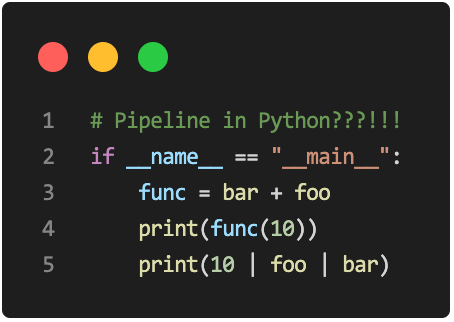Some useful but mainly useless tricks to use in Python

Pipeline operator
Models
Miss your dear and dear pipeline operator in ...
Well, you can have it in Python too!
Implementation
Python
from functools import update_wrapper
from typing import Any, Callable, Optional
class Pipeline:
def __init__(self, func: Optional[Callable] = None) -> None:
if func is not None:
update_wrapper(self, func)
self.funcs: list[Callable] = [func]
else:
self.funcs: list[Callable] = []
def __call__(self, *args: Any, **kwds: Any) -> Any:
"""
self(*) => self.funcs[0](self.funcs[1](self.funcs[2](...)))
"""
if len(self.funcs) == 0:
return None
res = self.funcs[-1](*args, **kwds)
for func in reversed(self.funcs[:-1]):
try:
res = func(res)
except Exception as e:
print(f"Error encountered when executing {func} with parameter {res}:")
raise e
return res
def __add__(self, func: Callable | "Pipeline") -> "Pipeline":
"""
(f + g)(*) => f(g(*))
"""
res = Pipeline()
res.funcs += self.funcs
if isinstance(func, Pipeline):
res.funcs += func.funcs
elif callable(func):
res.funcs.append(func)
else:
raise TypeError(f"Unsupported type {type(func)}")
return res
def __radd__(self, func: Callable | "Pipeline") -> "Pipeline":
res = Pipeline()
if isinstance(func, Pipeline):
res.funcs += func.funcs
elif callable(func):
res.funcs.append(func)
else:
raise TypeError(f"Unsupported type {type(func)}")
res.funcs += self.funcs
return res
def __or__(self, func: Callable | "Pipeline"):
"""
* | f | g => g(f(*))
"""
return func + self
def __ror__(self, func: Callable | "Pipeline" | Any):
if isinstance(func, Callable) or isinstance(func, Pipeline):
return self + func
else:
return self(func)
@Pipeline
def foo(a: int) -> list[int]:
return list(range(a))
@Pipeline
def bar(b: list[int]) -> int:
return max(b)
# Pipeline in Python???!!!
if __name__ == "__main__":
func = bar + foo
print(func(10)) # 9
print(10 | foo | bar) # 9How it works
The solution is simple:
- Define a wrapper function that keeps the original functions inside (
self.funcsis a list of callables) - Generate a new function upon operating at least one such function (e.g. pipeline operator
|which is seen asoroperation in Python, or adding two functions together likef+g <=> f(g(.))) - When calling such function, it will sequentially execute all the nested functions
- Add some finishing touches, and you are good to go!
Multi-statement lambda expression
Models
Multi-statement lambda expressions are commonly supported in other languages, such as:
But wait! What about Python?
func = lambda a, b: a + bSeems like Python only supports single-statement lambda expression... or is that so?
Well, you can have it too!
Implementation
Python
func = lambda a, b: (
a := a + 1,
b := b + 1,
a + b,
)[-1]How it works
Well, in python, the evaluation of a tuple is done sequentially, so you can use a tuple to mimic the behavior of a multi-statement lambda expression, where the return value could be specified by the index of element.
Note that in order to assign values in a tuple, you will need to use the walrus operator := introduced in Python 3.8. It will assign the value to the variable on the left, and return the value on the right, similar to the default behavior of = in C/C++ and many other languages.
